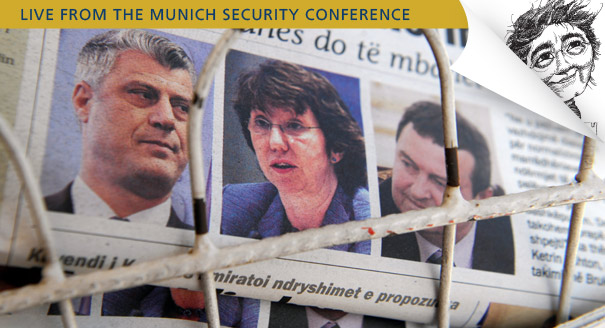Judy Dempsey
{
"authors": [
"Judy Dempsey"
],
"type": "commentary",
"blog": "Strategic Europe",
"centerAffiliationAll": "",
"centers": [
"Carnegie Endowment for International Peace",
"Carnegie Europe"
],
"collections": [],
"englishNewsletterAll": "",
"nonEnglishNewsletterAll": "",
"primaryCenter": "Carnegie Europe",
"programAffiliation": "",
"programs": [],
"projects": [],
"regions": [
"Western Europe",
"Europe"
],
"topics": [
"EU",
"Foreign Policy"
]
}
Source: Getty
How the EU Brought Serbia and Kosovo to a Deal
Last year’s agreement between Serbia and Kosovo to normalize relations remains a major EU foreign policy success. Now, it should have a positive impact on the rest of the region.
It was an incredible sight. For anyone who had spent time covering the Balkan wars of the 1990s, it was highly emotional to hear the EU’s policy chief, Catherine Ashton, chatting with Ivica Dačić, the prime minister of Serbia, and Hashim Thaçi, the prime minister of Kosovo.
The three of them were facing participants during the third day of this year’s Munich Security Conference.
There was no animosity, no trading of insults, no long monologues about history and past grievances. Instead, Ashton, unusually relaxed, conducted a fascinating conversation with Dačić and Thaçi over how and why they decided to end a centuries-old dispute and normalize relations.
Both leaders immediately acknowledged that without any perspective of joining the EU, they would not have made the huge jump to the negotiating table in Brussels.
For Western Europeans, it is easy to forget how attractive the EU remains not only to countries in the Western Balkans but also to the many Ukrainians who, over the past two months, have been waving EU flags to show their desire to be part of the EU.
Dačić and Thaçi also had immense praise for Ashton’s endurance and persistence in starting and leading the talks that led to a deal in April 2013. “She didn’t impose things on us,” Dačić said.
When the talks began in 2011, few of Europe’s leaders held out any hopes of success. They willingly delegated such a thorny issue to Ashton, knowing that they would not have to accept responsibility if she failed. Today, European governments acknowledge that, on the right issue, the EU can be an effective and successful foreign policy player.
Yet Ashton reminded her audience in Munich just how difficult it had been to get the Serbian and Kosovar leaders even to sit at the same table in Brussels.
After all, mutual distrust ran deep. The memory of the war between Serbia and Kosovo in the late 1990s was always in the background, as was the Serbs’ sense of humiliation after NATO had bombed their country in 1999. There was little public trust or support for dialogue.
Even once Ashton managed to start a dialogue, with a minimum of publicity, it was so often touch and go that the talks would break down.
The two prime ministers recalled one such interruption. “I was on the way back to [the Kosovar capital] Pristina,” Thaçi said. “And I was on the way back to [the Serbian capital] Belgrade,” Dačić added. Ashton was almost distraught. But late at night, the authorities at Brussels airport told her that two planes were about to land: those of Dačić and Thaçi.
Having returned to the negotiating table of their own volition, the two delegations and Ashton’s team tackled immensely difficult issues. Questions ranged from how to determine the status of the Serb-majority area of Northern Kosovo to how to ensure that border controls would allow the free movement of people and goods. And of course, there was the extraordinarily challenging task facing the Serbian prime minister of persuading his people to recognize the breakaway region of Kosovo.
“I think that has been one of the most difficult things,” Dačić said. “After all, for so many Serbs, Kosovo belongs to Serbia. But I just had to recognize that the time had come to negotiate and then sell the deal.”
For Thaçi, the accord ended over fourteen years of uncertainty since the end of the war, when Kosovo was placed under UN administration. “With the beginning of the dialogue, it was the biggest victory,” he said. “We knew where we were going. The agreement was to liberate ourselves form the past.”
There is still a huge amount of work to consolidate the deal. But the possibility that Serbia and Kosovo will one day join the EU now provides both leaders and their populations with a compass.
Over time, the accord will hopefully have positive implications for the rest of the Western Balkans, where there is still much unfinished business, especially in Bosnia and Herzegovina and in Macedonia. An upbeat Thaçi said the success of the Serbia-Kosovo breakthrough was a success for the region. Let’s hope so.
About the Author

Nonresident Senior Fellow, Carnegie Europe
Dempsey is a nonresident senior fellow at Carnegie Europe
- Europe Needs to Hear What America is SayingCommentary
- Babiš’s Victory in Czechia Is Not a Turning Point for European PopulistsCommentary
Judy Dempsey
Recent Work
Carnegie does not take institutional positions on public policy issues; the views represented herein are those of the author(s) and do not necessarily reflect the views of Carnegie, its staff, or its trustees.
More Work from Strategic Europe
- Taking the Pulse: Can European Defense Survive the Death of FCAS?Commentary
France and Germany’s failure to agree on the Future Combat Air System (FCAS) raises questions about European defense. Amid industrial rivalries and competing strategic cultures, what does the future of European military industrial projects look like?
Rym Momtaz, ed.
- Macron Makes France a Great Middle PowerCommentary
France has stopped clinging to notions of being a great power and is embracing the middle power moment. But Emmanuel Macron has his work cut out if he is to secure his country’s global standing before his term in office ends.
Rym Momtaz
- How Europe Can Survive the AI Labor TransitionCommentary
Integrating AI into the workplace will increase job insecurity, fundamentally reshaping labor markets. To anticipate and manage this transition, the EU must build public trust, provide training infrastructures, and establish social protections.
Amanda Coakley
- Can Europe Still Matter in Syria?Commentary
Europe’s interests in Syria extend beyond migration management, yet the EU trails behind other players in the country’s post-Assad reconstruction. To boost its influence in Damascus, the union must upgrade its commitment to ensuring regional stability.
Bianka Speidl, Hanga Horváth-Sántha
- Taking the Pulse: Can the EU Attract Foreign Investment and Reduce Dependencies?Commentary
EU member states clash over how to boost the union’s competitiveness: Some want to favor European industries in public procurement, while others worry this could deter foreign investment. So, can the EU simultaneously attract global capital and reduce dependencies?
Rym Momtaz, ed.









